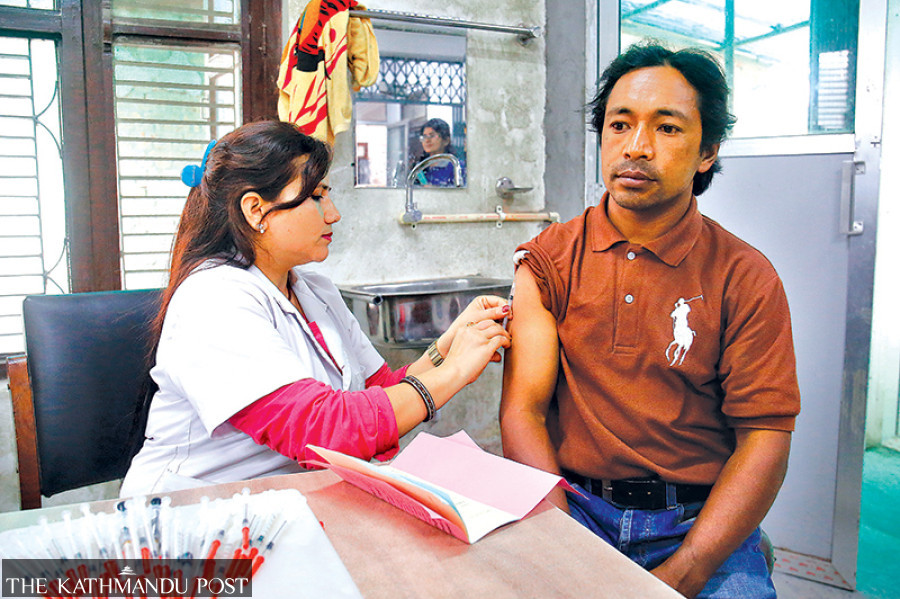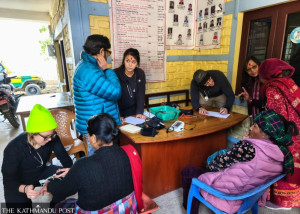Health
Eleven people died of rabies at Teku Hospital in last eight months
Experts warn the country’s lax approach may jeopardise the goal to end dog-transmitted rabies by 2030.
Post Report
A few months ago, an eight year old boy from Tanahun, who was brought to the Sukraraj Tropical and Infectious Disease Hospital for the treatment of rabies, succumbed while undergoing treatment. Doctors at the hospital said that the boy was brought to hospital only after symptoms of rabies infection appeared.
“It is impossible to save a patient once symptoms appear,” said Dr Sher Bahadur Pun, chief of the Clinical Research Unit at the hospital. “There’s no treatment available at that point.”
The case is among the 11 deaths at the Sukraraj hospital from the rabies infection, since the start of the ongoing fiscal year 2023-24. And what experts find worrying is neither the incidents of dog bites have declined nor the deaths from rabies, which poses serious challenges to the country’s aim to eliminate dog-transmitted rabies by 2030, a target set by the World Health Organization.
It is estimated that over 100 people die of rabies every year throughout the country, but the Ministry of Health and Population has records of only the deaths that occurred at the Sukraraj Tropical and Infectious Disease Hospital. The hospital’s records show between 15 and 36 people die of rabies every year.
It is estimated that nearly 60,000 dog bites incidents get recorded in state-run health facilities every year.
“We are nowhere close to ending rabies in humans, as dog bite incidents have been rising alarmingly,” said Pun. “Every day around 300 people seek anti-rabies vaccination at Teku Hospital alone. A lot of people also get inoculated with rabies vaccines from private hospitals and pharmacies.”
Doctors say the majority of victims dying of rabies are children and poor. Due to the fear of getting scolded by parents or fear of injections, children generally do not tell their parents about such incidents. Poor people too avoid the anti-rabies vaccination, as a vial of rabies vaccine costs around Rs500 and each victim needs three to four vials.
Though the government provides anti-rabies vaccines free of cost from state-run health facilities, many people do not know about it. Some dog-bite victims only seek tetanus shots instead of the rabies vaccine. Pharmacists too do not encourage victims to administer rabies vaccines. Some people also think that if the dog is small, it does not have the rabies virus, according to doctors.
“A relative of a dog bite victim told me that his relative was bitten by a puppy, but all in the family thought that puppy is free of rabies,” said Pun.
In some cases, dog bite victims ask the people they meet near to the incident site if they know the dog, from which they were bitten, is okay. To console the victim, people ask the victim not to worry, as they know the dog. Some people also think that anti-rabies vaccination is not required if the dog is a pet.
“One should not take the risk lightly,” said Shankar Pandey, an official at the Sukraraj Hospital. “As there is no treatment of rabies infection after the appearance of symptoms, one must take anti-rabies shot if bitten by a dog.”
Experts ask authorities concerned to launch awareness drives about the risk and availability of free treatment.
Rabies, according to the World Health Organisation, causes 59,000 agonising and painful deaths globally every year, one person every nine minutes, mostly children and the poor. The disease, while fatal, is 100 percent preventable if there is access to vaccines and life-saving treatment in the event of dog bites.




 10.12°C Kathmandu
10.12°C Kathmandu













